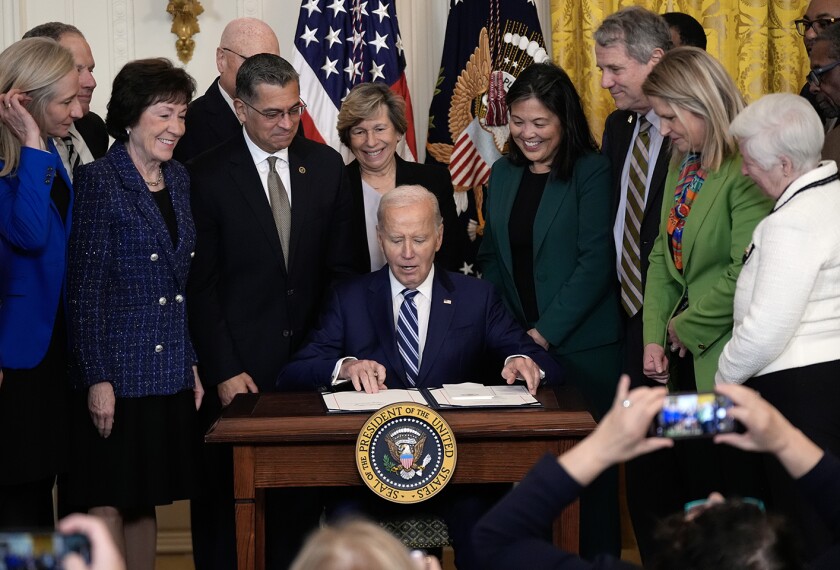Teachers’ satisfaction with their careers has increased significantly over the past two decades, according to an annual survey by the Metropolitan Life Insurance Co. and the Committee for Economic Development, which tracks the opinions of teachers, principals, and education deans.
“The MetLife Survey of the American Teacher: Expectations and Experiences” of 2006 is available from the Metropolitan Life Insurance Company.
The “MetLife Survey of the American Teacher: Expectations and Experiences” of 2006 also compares this year’s data with the results of 22 earlier MetLife polls. Notably, teacher satisfaction is at a 20-year high: Fifty-six percent of the 1,001 teachers polled earlier this year reported being “very satisfied” with their careers, in comparison with just 40 percent in 1984, the first year of the survey.
That outcome is somewhat surprising, given anecdotal and survey evidence in recent years suggesting that teachers have gotten discouraged with what they see as an increasing loss of autonomy over their classrooms and an abundance of mandated tests.
How prepared were you for the following aspects of your first teaching positions: extremely prepared, very prepared, prepared, not too prepared, or not at all prepared?
*Click image to see the full chart.

SOURCE: MetLife Survey
Teacher satisfaction appears to be closely intertwined with the perceived prestige of the profession, according to the survey. Dissatisfied teachers are more than twice as likely as satisfied ones to feel their communities don’t treat them as professionals.
Despite the apparent career satisfaction, one-quarter of all teachers polled said they were planning to leave the profession by 2011, a contradiction that MetLife Foundation President Sibyl Jacobson refers to as “the glass being half full.”
“It’s very concerning that of the veteran teachers, many of them say they plan to leave in the next five years,” Ms. Jacobson said. “Whether that’s from demographics, burn-out, I’m not sure. But I do know that is a warning sign, particularly because we have a need for teachers and a need to retain teachers.”
Teachers are driven to leave the profession by unmet expectations, a lack of preparation, and a lack of support from colleagues and principals, the poll concludes. Those who said they planned to leave were more likely to report unfulfilled expectations when it came to the prestige, salary, and benefits of teaching. They were also more likely to say they felt unprepared to work with children of varying needs and to work for principals who did not ask for their input, show appreciation for their work, or treat them with respect.
Practical Help
The grievances of the dissatisfied teachers did not surprise Eric Hirsch, the executive director of the Center for Teaching Quality, located in Hillsborough, N.C.
“That is exactly what background research says,” Mr. Hirsch said, citing data indicating that the No. 1 reason dissatisfied teachers say they leave the profession is a lack of leadership support.
Teachers also reported needing more training to prepare for their first year in the classroom.
Ms. Jacobson, a former teacher, believes that teacher-educators can learn a lot from the results of the survey, especially the areas in which first-year teachers say they had misconceptions, such as the number of hours they would be required to work.
“I think that is something that can be addressed in teacher preparation, as well as classroom management, or how to deal with parents or a diverse student body,” she said.
“College education programs might think of some of these things as too simple, but we all need help in terms of the practical areas,” Ms. Jacobson said.
Mr. Hirsch agreed. While there are many excellent teacher-preparation programs, he said, “there are a lot of programs out there that are just not getting it done. There’s an onus of responsibility on the preparation programs.”
Over the past 20 years, views on how to recruit and retain qualified teachers have changed significantly. In 1986, just 38 percent of principals said that providing teachers with good equipment and supplies helped attract and retain qualified instructors; today, 60 percent of principals agree with that statement.
Similarly, more teachers today than in 1986 believe that providing better equipment and supplies (74 percent vs. 69 percent), more parent involvement (67 percent vs. 56 percent), and closer matches between student needs and teacher capabilities (63 percent vs. 55 percent) will help considerably in the recruitment and retention of qualified teachers.
The study sampled 1,001 public school teachers, 500 principals, and 200 deans of schools of education and education department chairpersons by phone in March and April.




